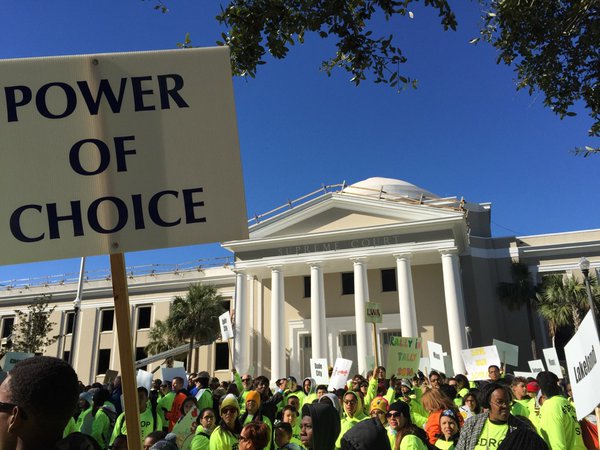
If you asked parents of students victimized by bullying (like this one, this one and this one) to describe the school choice scholarships that helped their kids find some educational peace, they’d probably offer words like “life-saving” and “miraculous.”
To Gwen Graham, though, the word that comes to mind is “diabolical.”
“Diabolical” is how Graham, a Democratic candidate for governor in Florida, described Florida’s new Hope Scholarship, which lawmakers engineered to give options to all bullying victims. “It is another move by the Legislature to decrease the funding in Tallahassee and increase the funding for their private and charter schools,” she told the Tallahassee Democrat editorial board. “It is diabolical. It truly is.”
That Democratic candidates might feel obliged to condemn school choice is no surprise, given the fact that teachers unions, whose members work almost exclusively in district-operated schools, contribute heavily to the Democratic Party. That’s even true in Florida, arguably the most choice-friendly state in America. But unlike many other states, where school choice is still an abstraction, candidates who denounce choice in Florida are also explicitly denouncing the hundreds of thousands of parents who choose. Here, growing numbers of parents in core Democratic constituencies freely choose charter schools and private school scholarships, and surveys show they like what they have found.
I’m no political analyst. But the basic math would seem to be a caution flag for Democrats. Since the last gubernatorial election in 2014, the number of students using the Florida Tax Credit Scholarship, the largest private school choice program in America, has climbed more than 50 percent, to 107,000. The number of charter students has increased by about 20 percent, to nearly 300,000.
Judging by the demographics, their parents lean heavily Democratic. The average family income of a tax credit scholarship student is $25,360 a year, and 68 percent of the students are black or Hispanic. In Florida charter schools, 62 percent of students are black or Hispanic.
Florida has also created a major new choice program since the last election – the Gardiner Scholarship, an education savings account for students with special needs such as autism and Down syndrome. It now serves more than 10,000 students. I couldn’t hazard a guess about their parents’ politics, but I know they’re signing up so quickly the scholarship now has a waiting list, and they are the kind of parents who aren’t likely to be amused by politicians who want to take away education tools that are helping their children.
Remember, too, that Florida’s past two gubernatorial elections were squeakers.
Republican Rick Scott won the 2010 contest over Democrat Alex Sink by 61,550 votes. He won in 2014 over Democrat Charlie Crist by 64,145 votes (out of 5,666,541 cast). Did the Democrats’ opposition to school choice play a role? For what it’s worth, one review of exit poll data suggests that in 2014, maybe it did.
Again, I’m no political analyst. But this is Florida. I wouldn’t bet against another white-knuckle ride on Nov. 6, where a handful of especially motivated voters could change the outcome.
Do this election cycle’s Democratic candidates understand who they are really criticizing when they reject choice?
Gwen Graham, who scored the state teachers union’s endorsement, is hardly the outlier.
Phillip Levine derides charter schools as “someone else’s business,” distinct from “our business, which is called public school.” Andrew Gillum is “strongly opposed to unaccountable, for-profit charter schools who want to use public dollars to enrich their executives.” Chris King accuses lawmakers of “playing political games and signing backroom deals” because they made it easier for high-quality charters to take root in high-poverty areas.
Last but not least, billionaire Jeff Greene is “dead against” private school vouchers. This, even though he established a $28,000-a-year-tuition private school after deciding Florida public schools weren’t good enough for his kids. Why not vouchers? Because, he said, without a hint of self-awareness, “to throw in the towel and say, ‘Oh, we have lousy public schools. Let’s just go start other ones instead,’ and just let the public schools fall apart? I mean, it’s just it’s ridiculous, unacceptable.”
The Democrats’ rhetoric is not only at odds with their own constituents. It’s at odds with their party’s own history.
Bill Clinton and Barack Obama were bigtime charter school supporters. Legendary Florida Gov. Lawton Chiles, a Democrat, signed Florida’s charter school legislation into law. And in 2010, nearly half the Democrats in the Florida Legislature supported the change that allowed the tax credit program to steadily grow and, since then, triple in size. Rank-and-file Democrats who think demagoguing charters and vouchers is in line with Democratic values should consider the rich history of choice support on the left, and the likes of Rosa Parks, Wyatt Tee Walker and Joe Trippi.
If history doesn’t move them, Democratic parents eventually will.
Full disclosure: Step Up For Students, which hosts this blog and pays my salary, administers four state-supported educational choice programs – the Florida Tax Credit Scholarship, the Gardiner Scholarship, the Hope Scholarship and the new Reading Scholarship for public school students.


